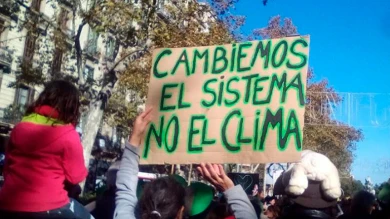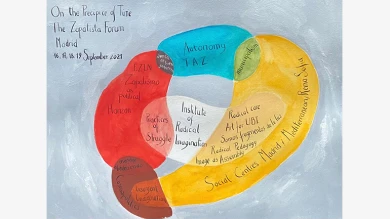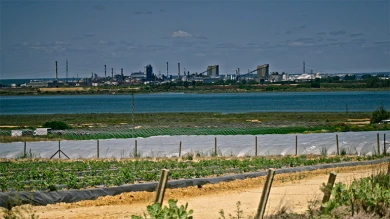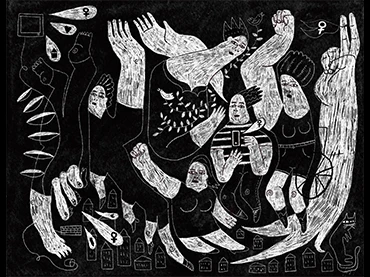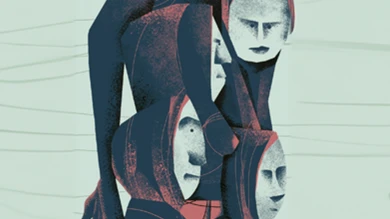These sessions explore different formats with which artistic tools enable other possible worlds to be imagined: mapping networks of activism, drawing up manifestos, creating spaces of assembly in the framework of art and developing collective dramaturgies as modes of investigating the present. Researchers, artists and activists from the Institute of Radical Imagination will share their experiences on artistic platforms as strategies of subjectivation and political action in the projects Art for UBI (Universal Basic Income) and Art for Radical Ecologies, in addition to studying the approach to radical pedagogies via projects such as The School of Emergencies, Kirik and Raising Care. Finally, the Centro Revolucionario de Arqueología Social (Revolutionary Centre of Social Archaeology, CRAS), alongside the Institute of Radical Imagination (IRI), will raise issues around the situation of CSA La Tabacalera in Lavapiés after thirteen years of free culture and self-management.
![Maja Bajevic, Arts, Crafts and Facts (Top 10%, 90%) [Artes, artesanías y datos (Ricos 10%, 90%)], 1967. Museo Reina Sofía](https://recursos.museoreinasofia.es/styles/large_landscape/public/Actividades/nim.jpg.webp)
Held on 20, 21 Apr, 25, 26 May, 05, 06 Jul 2023
Inside the framework of the Critical Node Militant Research, from the Museo Reina Sofía’s Study Programme Connective Tissue, the Foundation of the Commons, the Institute of Radical Imagination and La Laboratoria, in collaboration with the Museo en Red team, put forward a space of training and study on the specificity of forms of militant research. Situated outside academic frameworks, these investigations pick up the legacy of workers’ co-research from the 1960s, feminist epistemologies and theories of research-action. Therefore, more than establishing a method, they seek to generate devices in order for social struggles to read each other and find causes that lead to action.
This Critical Node looks to reflect on (and from) tools and learnings from networks with which the Museo has been collaborating over the past fifteen years, in relation to those processes of knowledge production which ultimately aim not to interpret the world but to organise its transformation.
[dropdown]
The Institute of Radical Imagination (IRI) is a Mediterranean-wide network founded in 2017 by artists, activists, academics and cultural producers with a shared interest in co-producing knowledge, artistic and political research and interventions aimed at implementing post-capitalist ways of life. With the vocation of joining art, activism and pedagogy, the IRI emerges as a post-capitalist institution — a "quasi-institution" — which operates as an interface between diverse spaces and agents, causing mutual contamination between academic institutions, museums and self-managed social centres.
La Laboratoria. Spaces of Feminist Research is a transnational device of feminist activist research, that which is developed by those involved in different territories, involved in specific conflicts and struggles, with different yet common languages and questions. The research applies the lens of feminist contempt to diverse processes, flowing beyond any drawer or pigeonhole of so-called "women’s" issues. With participation from four cities — Buenos Aires, Quito, New York and Madrid — La Laboratoria promotes activist research inside the feminist tide as situated theoretical practice allowing maps of position and analysis to be constructed collectively.
Foundation of the Commons is a laboratory of discourse and political action, entangling a series of research, publishing, training and bookshop groups that pool resources to drive the development of critical culture and social democratisation. The structure of the network is made up of social and research spaces (La Casa Invisible, Ateneo La Maliciosa, Traficantes de Sueños, IDRA, Ateneu Candela, Synusia and Katakrak) from different corners of the Iberian Peninsula (Málaga, Madrid, Barcelona, Terrassa, Iruñea-Pamplona).
[/dropdown]
Organised by
Inside the framework of
Connective Tissue. The Museo Reina Sofía’s Study Programme: Critical Node, Militant Research



Participants
Participants
-
Thursday, 20 April 2023 Nouvel Building, Protocol Room
Session 1
6pm Approach to Radical Pedagogies: The School of Emergencies and Kirik
— With the participation of Dimitry Vilensky and Zeyno Pekünlü (Institute of Radical Imagination)7:30pm Artistic Platforms as Strategies of Subjectivation and Political Action: Art for UBI and Art for Radical Ecologies
— With the participation of Marco Baravalle, Gabriella Riccio and Emanuele Braga (Institute of Radical Imagination) -
Friday, 21 April 2023 CSA La Tabacalera (calle de Embajadores 51, Madrid)
Session 2
11am Research and Artistic Practices from Self-management
— With the participation of Pablo García Bachiller, Gabriella Riccio and Marco Baravalle (Institute of Radical Imagination) -
Friday, 21 April 2023 Nouvel Building, Protocol Room
Session 3
Tickets6pm Approach to Radical Pedagogies: Raising Care
— With the participation of Maddalena Fragnito, Elena Blesa Cábez and Theo Prodromidis (Institute of Radical Imagination)7:30pm The Common and the Legal: Tools and Strategies
— With the participation of Giuseppe Micciarelli, Gabriella Riccio and Pablo García Bachiller (Institute of Radical Imagination)
Can a summer camp be considered a militant research practice? And the list of organic suppliers who stock a social centre’s canteen? In the following sessions, the Foundation of the Commons explores how spaces of knowledge production forged in the heat of social movements’ political and organisational practices are shaped. To this end, keys to two research devices are shared: Encuesta Inquilina (The Tenant Survey) — propelled with Sindicat de Llogaters from Barcelona — and the line of work around the eco-social crisis, articulated through the series of self-training and encounters The Future Is Unwritten. Organising in the Capitalocene Crisis. Drawing from these experiences, the aim is to put into practice possible militant research.
-
Thursday, 25 May 2023 Nouvel Building, Protocol Room and Online platform
Session 4
Online platform6:30pm La Encuesta Inquilina (The Tenant Survey)
— With the participation of IDRA (The Urban Research Institute of Barcelona) (Foundation of the Commons)7:45pm The Future Is Unwritten
— With the participation of Synusia, Katakrak and Traficantes de Sueños (Foundation of the Commons) -
Friday, 26 May 2023 Ateneo La Maliciosa (calle de las Peñuelas 14, Madrid)
Session 5
Online platform11am How Do We Conduct Militant Research?
— With the participation of IDRA, Synusia, Katakrak and Traficantes de Sueños (Foundation of the Commons)
This session sees La Laboratoria look to apply situated research to the systemic dimension and the interconnection between different forms of violence: social, sexual, economic, judicial. It looks to explore the potential of the situated epistemological perspective to deploy a radical critique of hegemonic discourses on violence or the role of States in legitimising and concealing some forms of violence and criminalising others, raising, from collective practices, the possibilities of transformative feminist justice. Alongside feminist researchers and collectives from Quito, Porto Alegre, Buenos Aires, New York and Madrid, and at the crossroads of movements for prison abolition, against the criminalisation of poverty, and dissident street feminisms, a space is opened from which to reflect on the possibilities of thinking about justice as a collective practice, where mutual protection, support, accountability and remediation go hand in hand with a critique of patriarchal, racist and class-biased logics.
-
Wednesday, 5 July 2023 Nouvel Building, Auditorium 200 and online platform
Session 6
Tickets5pm Introduction. What Does Investigating Violence from a Situated Perspective Mean?
— With the participation of Susana Draper (Madres Protectoras) and Itzell Sánchez (Técnicas Rudas / Colectiva Acción Directa Autogestiva). Supported by Débora Ávila7pm All that Crushes Us. Intersecting Violence
— With the participation of María José Barrera (Colectivo de Prostitutas de Sevilla), Luci Cavallero (Ni Una Menos) and Ana Pinto (Jornaleras de Huelva en lucha). Supported by Constanza CisnerosThis activity offers a play centre for children to help parents with childcare. The registration form can be found at this link.
-
Thursday, 6 July 2023 Nouvel Building, Protocol Room and online platform
Session 7
Tickets5pm Debates around (Anti)Punitivism from Situated Feminist Struggles
— With the participation of Vicky García (La Laboratoria Nodo Europa Sur), Fernanda Martins and Laia Serra. Supported by Justa Montero7pm Beyond Victimisation. Feminist Self-defence and Strategies of Community Responsibility
— With the participation of Jazmin Sofia Escuntar Chavez (Mujeres de Frente), Martha Cecilia Collaguazo Velasco (Mujeres de Frente), Maria Jose "Guru" Jiménez Cortiñas (Asociación Gitanas Feministas por la Diversidad), Aida Elizabeth Pino Naranjo (Mujeres de Frente) and Helena Silvestre (Escola Feminista Abya Yala). Supported by Tatiana RomeroThis activity offers a play centre for children to help parents with childcare. The registration form can be found at this link.
Más actividades
![Tracey Rose, The Black Sun Black Star and Moon [La luna estrella negro y negro sol], 2014.](https://recursos.museoreinasofia.es/styles/small_landscape/public/Obra/AD07091_2.jpg.webp)
On Black Study: Towards a Black Poethics of Contamination
Monday 27, Tuesday 28 and Wednesday 29 of April, 2026 – 16:00 h
The seminar On Black Study: Towards a Black Poethics of Contamination proposes Black Study as a critical and methodological practice that has emerged in and against racial capitalism, colonial modernity and institutional capture. Framed through what the invited researcher and practitioner Ishy Pryce-Parchment terms a Black poethics of contamination, the seminar considers what it might mean to think Blackness (and therefore Black Study) as contagious, diffuse and spreadable matter. To do so, it enacts a constellation of diasporic methodologies and black aesthetic practices that harbor “contamination” -ideas that travel through texts, geographies, bodies and histories- as a method and as a condition.
If Blackness enters Western modernity from the position of the Middle Passage and its afterlives, it also names a condition from which alternative modes of being, knowing and relating are continually forged. From within this errant boundarylessness, Black creative-intellectual practice unfolds as what might be called a history of touches: transmissions, residues and socialities that unsettle the fantasy of pure or self-contained knowledge.
Situated within Black radical aesthetics, Black feminist theory and diasporic poetics, the seminar traces a genealogy of Black Study not as an object of analysis but as methodological propositions that continue to shape contemporary aesthetic and political life. Against mastery as the horizon of study, the group shifts attention from what we know to how we know. It foregrounds creative Black methodological practices—fahima ife’s anindex (via Fred Moten), Katherine McKittrick’s expansive use of the footnote, citation as relational and loving labour, the aesthetics of Black miscellanea, and Christina Sharpe’s practices of annotation—as procedures that disorganise dominant regimes of knowledge. In this sense, Black Study is approached not as a discrete academic field but as a feel for knowing and knowledge: a constellation of insurgent practices—reading, gathering, listening, annotating, refusing, world-making—that operate both within and beyond the university.
The study sessions propose to experiment with form in order to embrace how ‘black people have always used interdisciplinary methodologies to explain, explore, and story the world.’ Through engagements with thinkers and practitioners such as Katherine McKittrick, C.L.R. James, Sylvia Wynter, Christina Sharpe, Fred Moten, Tina Campt, Hilton Als, John Akomfrah, fahima ife and Dionne Brand, we ask: What might it mean to study together, incompletely and without recourse to individuation? How might aesthetic practice function as a poethical intervention in the ongoing work of what Sylvia Wynter calls the practice of doing humanness?

Intergenerationality
Thursday, 9 April 2026 – 5:30pm
This series is organised by equipoMotor, a group of teenagers, young people and older people who have participated in the Museo Reina Sofía’s previous community education projects, and is structured around four themed blocks that pivot on the monstrous.
The third session gazes at film as a place from which to dismantle the idea of one sole history and one sole time. From a decolonial and queer perspective, it explores films which break the straight line of past-present-future, which mix memories, slow progress and leave space for rhythms which customarily make no room for official accounts. Here the images open cracks through which bodies, voices and affects appear, disrupting archive and questioning who narrates, and from where and for whom. The proposal is at once simple and ambitious: use film to imagine other modes of remembering, belonging and projecting futures we have not yet been able to live.

Remedios Zafra
Thursday March 19, 2026 - 19:00 h
The José Luis Brea Chair, dedicated to reflecting on the image and the epistemology of visuality in contemporary culture, opens its program with an inaugural lecture by essayist and thinker Remedios Zafra.
“That the contemporary antifeminist upsurge is constructed as an anti-intellectual drive is no coincidence; the two feed into one another. To advance a reactionary discourse that defends inequality, it is necessary to challenge gender studies and gender-equality policies, but also to devalue the very foundations of knowledge in which these have been most intensely developed over recent decades—while also undermining their institutional support: universities, art and research centers, and academic culture.
Feminism has been deeply linked to the affirmation of the most committed humanist thought. Periods of enlightenment and moments of transition toward more just social forms—sustained by education—have been when feminist demands have emerged most strongly. Awareness and achievements in equality increase when education plays a leading social role; thus, devaluing intellectual work also contributes to harming feminism, and vice versa, insofar as the bond between knowledge and feminism is not only conceptual and historical, but also intimate and political.
Today, antifeminism is used globally as the symbolic adhesive of far-right movements, in parallel with the devaluation of forms of knowledge emerging from the university and from science—mistreated by hoaxes and disinformation on social networks and through the spectacularization of life mediated by screens. These are consequences bound up with the primacy of a scopic value that for some time has been denigrating thought and positioning what is most seen as what is most valuable within the normalized mediation of technology. This inertia coexists with techno-libertarian proclamations that reactivate a patriarchy that uses the resentment of many men as a seductive and cohesive force to preserve and inflame privileges in the new world as techno-scenario.
This lecture will address this epochal context, delving into the synchronicity of these upsurges through an additional parallel between forms of patriarchal domination and techno-labor domination. A parallel in which feminism and intellectual work are both being harmed, while also sending signals that in both lie emancipatory responses to today’s reactionary turns and the neutralization of critique. This consonance would also speak to how the perverse patriarchal basis that turns women into sustainers of their own subordination finds its equivalent in the encouraged self-exploitation of cultural workers; in the legitimation of affective capital and symbolic capital as sufficient forms of payment; in the blurring of boundaries between life and work and in domestic isolation; or in the pressure to please and comply as an extended patriarchal form—today linked to the feigned enthusiasm of precarious workers, but also to technological adulation. In response to possible resistance and intellectual action, patriarchy has associated feminists with a future foretold as unhappy for them, equating “thought and consciousness” with unhappiness—where these have in fact been (and continue to be) levers of autonomy and emancipation.”
— Remedios Zafra

ARCO2045. The Future, for Now
Saturday 7, March 2026 - 9:30pm
The future, its unstable and subjective nature, and its possible scenarios are the conceptual focus of ARCOmadrid 2026. A vision of the future linked to recent memory, a flash of insight into a double-edged sword. This year's edition, as in the previous two, will once again hold its closing party at the Reina Sofia Museum. This time, the star of the show is Carles Congost (Olot, Girona, 1970), one of the artists featured in the new presentation of the Collections recently inaugurated on the 4th floor of the Sabatini Building.
Carles Congost, with his ironic and timeless gaze, is responsible for setting the tone for this imperfect future, with a DJ session accompanied by some of his works in the Cloister on the first floor of the Sabatini Building of the Museo on the night of Saturday 7 March.

27th Contemporary Art Conservation Conference
Wednesday, 4, and Thursday, 5 March 2026
The 27th Contemporary Art Conservation Conference, organised by the Museo Reina Sofía’s Department of Conservation and Restoration, with the sponsorship of the Mapfre Foundation, is held on 4 and 5 March 2026. This international encounter sets out to share and debate experience and research, open new channels of study and reflect on conservation and the professional practice of restorers.
This edition will be held with in-person and online attendance formats, occurring simultaneously, via twenty-minute interventions followed by a five-minute Q&A.
